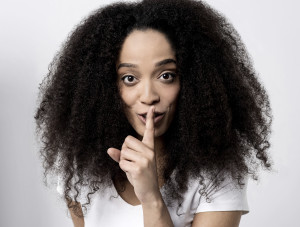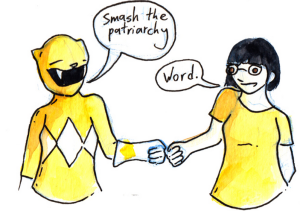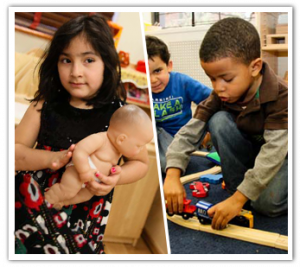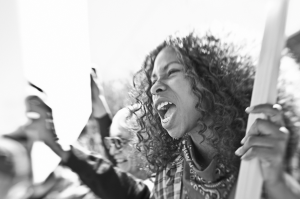Originally published on Role Reboot and republished here with their permission.

Two people sitting at a bar – one is out of focus in the background, resting his head in his hand and staring at the other person, who appears skeptical and rests their chin on their fist.
I’ve been on this planet for more than three decades now, and I’ve learned a lot about being a straight feminist woman post-puberty in romantic relationships.
Importantly, I’ve learned that there are some generally solid ways to figure out if the guy you’re dating is worth the long-term emotional, material, and financial investment that relationships require.
So how do you know if your new guy is going to see you as his equal and be a considerate partner who does his share of caretaking and housekeeping duties once the early dopamine-filled buzz fades away?
Here are a few questions to ask on a first (or early) date to make sure you’re not wasting your time (or future) with a guy who wants a full-time housekeeper, child bearer, and caretaker a lot more than he wants a partner who might have ambitions outside those areas that he needs to respect.
1. Who Are His Favorite Authors or Thinkers?
His list of author faves is mostly helpful in determining whether you have similar interests in general. For example, does he read at all? If not, that might be a problem for you if it’s something you’d like to share.
Here, you also want to pay close attention to whether or not this guy mentions any women authors at all. If he doesn’t think that women’s writing is worth checking out or hasn’t ever found a woman whose work he values, that could be a red flag.
2. Would He Change His Name When He Gets Married?
This is an intentional curveball.
Most conversations about name changing center on women deciding to conform to gender norms around marriage or pushing against them. A question about him changing names omits that focus on women altogether, pushing him to consider not only how important those traditions are to him, but how much he’s willing to defy them.
Call this the “ally versus accomplice” test. And watch his response carefully.
If he scoffs at the idea or explicitly says he would never marry a woman who wouldn’t take his name, you might have a problem on your hands. In particular, a guy who tells you that he has strict rules about traditional gender roles is telling you exactly who he’ll be in your relationship.
Perhaps for you, this is no big deal. But if you don’t want to spend the next thirty years arguing over gender, division of labor in a household, male “leadership” in the home, whether your daughter can play football, heterosexism, and other issues, you might want to move on.
3. Offer to Pay (Or Split the Bill)
So this is another test.
Any guy who completely resists you might be showing you that he cares more about tradition than your explicitly-stated individual preferences. (He, too, might be wondering whether this is a test of whether he is manly enough, but you are not that chick.)
Cool points for the guy who offers a compromise, maybe suggesting that he pays this time and you cover the next. Though watch out for the dudes who bring you to a much more expensive place when it’s your turn to pay. I’ve dated that guy. He’s trifling.
4. Observe: Does He Say Sorry?
One of my biggest pet peeves, characteristic of many an entitled, arrogant, and condescending dudes, is a complete refusal to sincerely apologize or acknowledge when he does wrong.
Both of these things are important traits in a partner that respects women and sees them as equal – if he doesn’t think he makes mistakes, he’ll always lay the blame directly on you or belittle your concerns (this is often called “gaslighting”).
If he shows up a bit late, he should apologize. If he bumps into someone, he should apologize. Instead of saying “sorry,” guys who don’t apologize usually phrase their apologies in “hopes.” For example, “Hi, I had hoped to get here earlier, but that didn’t work out” instead of “I’m sorry I’m late.”
As a woman living under constant social pressures, I’ve picked up the awful habit of apologizing for everything, so I know that life provides plenty of opportunities to use that little word. If you’ve been out on a few dates with someone and you’ve never heard them say the word, take note.
5. What Does He Think of a Famous Abuser?
Does he think that Bill Cosby is innocent? Think it’s okay that David Bowie gave drugs to and slept with (legally raped) 15-year-old girls? Does he think that it was perfectly fine that R. Kelly picked up dates at high schools? Think Kobe Bryant just happened to have the blood of his alleged rape victim on his shirt?
If this guy defends (alleged) rapists, run. Seriously, run. Someone who doesn’t believe or trust women probably won’t believe or trust you.
6. How Does He Weigh in On Issues of Racism, Queerantagonism, or Ableism?
Since you’re reading this, I’m going to assume that you’re a feminist who takes intersectionality seriously. That is, you’re not just concerned about women affected by sexism, but also about all the other forms of oppression that affect women, such as racism, heterosexism, transantagonism, and ableism.
Talk about these issues explicitly over dinner if you can and see how he reacts. Describe a recent situation or issue that involves discrimination that bothers or concerns you, and watch how he weighs in. If there are red flags, he’ll make those clear for you.
***
So, that’s it. There’s no perfect list for uncovering all shadiness, but this should be pretty good in discerning if a person is worth your time. All it takes is being intentional, thoughtful, and, most importantly, willing to let go.
Trust me on this: there are a lot of lonely, miserable married people. It’s so much better to be single than committed to someone who doesn’t match you.
[do_widget id=’text-101′]
Khadijah Costley White is an assistant professor in the Department of Journalism and Media Studies at Rutgers University in New Brunswick. Find her on Twitter here.
Search our 3000+ articles!
Read our articles about:
Our online racial justice training
Used by hundreds of universities, non-profits, and businesses.
Click to learn more




















